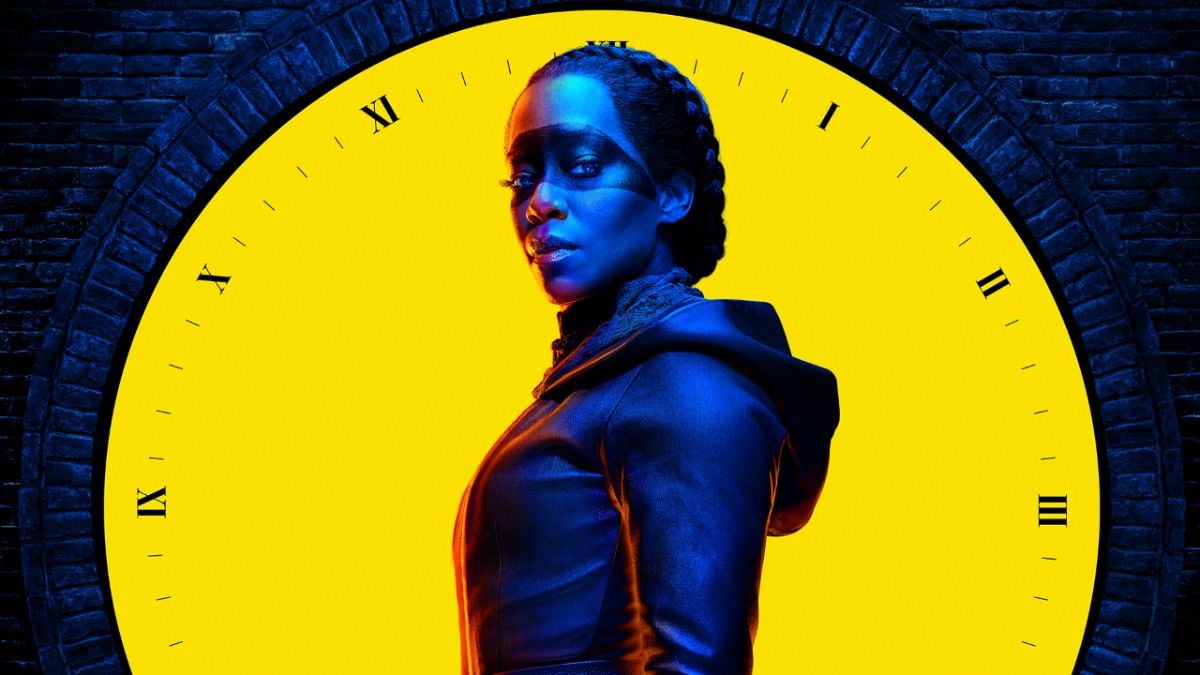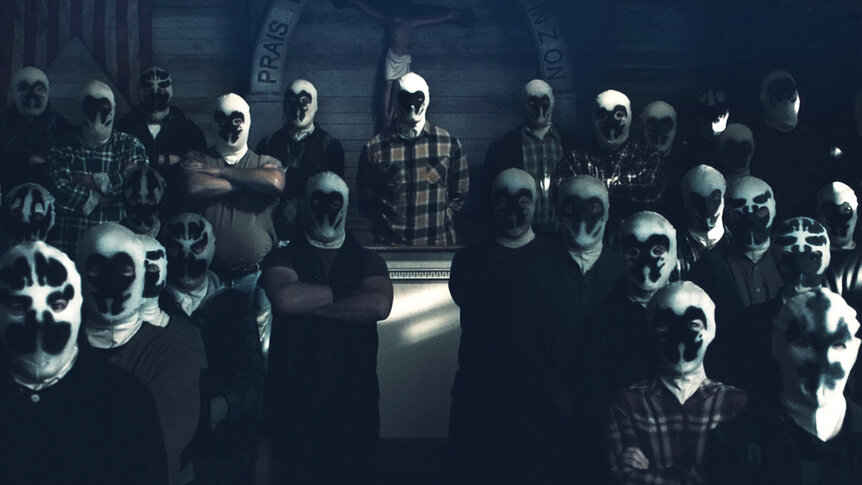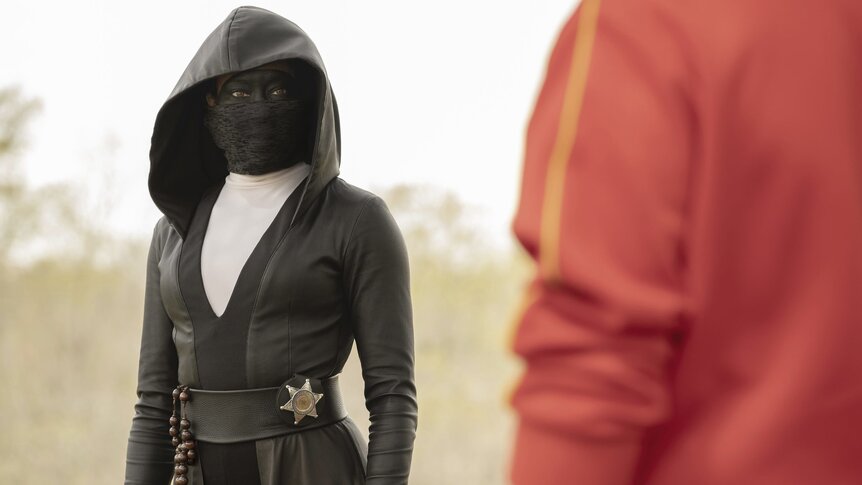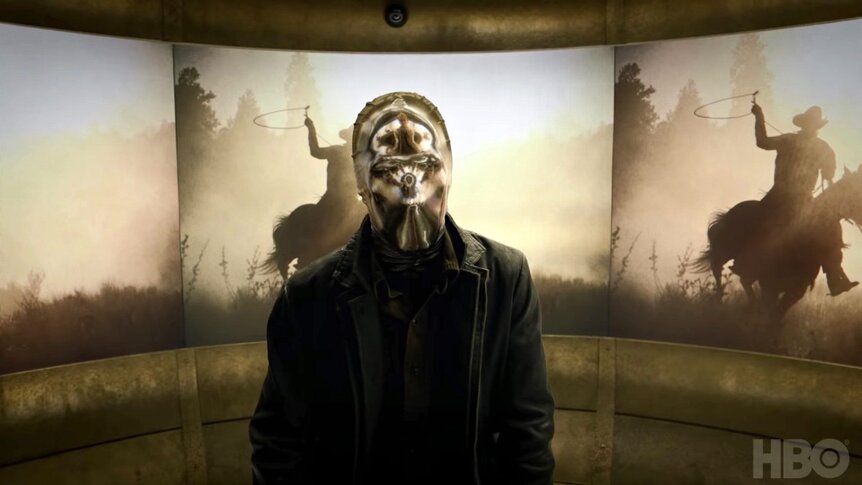Create a free profile to get unlimited access to exclusive videos, sweepstakes, and more!
How HBO's Watchmen deals with Alan Moore and adaptation: It's got to piss some people off

There's an ominous shadow looming over HBO's upcoming Watchmen series — and it's not the silhouette of a giant, deadly, inter-dimensional squid (although he's there too). No, it's the bearded specter of Alan Moore, the legendary comic writer who penned the original Watchmen and has famously disavowed any adaptations of any of his works. By choice, he isn't credited in the HBO series, and he'd much rather it not exist. The built-in disregard from the master writer is something that the new series' showrunner, Damon Lindelof, has to grapple with.
"I had to take — and continue to have to take — a defensive position when it comes to Watchmen, for all the obvious reasons," Lindelof tells SYFY WIRE at Watchmen's New York press junket. "The most obvious reason being that this was generated by a genius — multiple geniuses, but namely Alan Moore — who doesn't want this work adapted."
It's not the first time that Moore's masterpiece has been adapted (and, from Moore's perspective, sullied). Zack Snyder made it into a movie in 2009, and it was very much a Zack Snyder movie, for better or worse. Then, in 2012, DC made a prequel series of comics titled Before Watchmen, and later brought the Watchmen characters into the main DC continuity with Doomsday Clock.
To quote Watchmen, it would be a "thermodynamic miracle" if Moore endorsed the HBO show, but Lindelof, who is best known for creating Lost and The Leftovers, is trying to do right by the iconic title. And even purists who agree with Moore that Watchmen shouldn't be messed with should be thankful Lindelof is taking the Watchmen mantle so seriously. In this IP-centric media landscape, it was a question of when, not whether, Watchmen would come to TV.
"It became very clear to me, the third time that they offered me Watchmen, that if I didn't do it, somebody else was going to," Lindelof says, adding that he still wouldn't have taken the job if he hadn't actually come up with an idea that he thought was "worth doing."
Lindelof's Watchmen is, notably, not an adaptation. Instead, it's set in 2019, decades after the events of the graphic novel. Off the bat, the only familiar characters are Jean Smart's Laurie Blake/Silk Spectre, now 70 years old, and Jeremy Irons, who HBO has all but confirmed is playing Adrian Veidt/Ozymandias. Most of the action focuses on new characters living in Tulsa, Oklahoma, where police officers have started wearing masks and costumes to hide their true identities in the wake of a deadly attack by the Seventh Cavalry, a group of white supremacists who were inspired by Rorschach's seemingly published journal.
Regina King, fresh off an Emmy win for her role as a grieving mother of police violence in Netflix's Seven Seconds, plays Angela Abar, a detective who adopts the costumed identity of Sister Night while on the job. Judd Crawford (Don Johnson) leads the police force, and Tim Blake Nelson plays Looking Glass, another costumed detective and master interrogator who wears a mirrored mask. When the Seventh Cavalry resumes its acts of violence after a period of dormancy, dark secrets come to light, especially as the mysterious Will Reeves enters Angela's life with powerful secrets of his own. There's a conspiracy at work.
The original Watchmen inserted superheroes into the tensions of the '80s and the perils of the Cold War, while Lindelof's Watchmen updates the issues along with the times. The 2019 of Watchmen is different from our own in many ways (cell phones and the internet were apparently never invented), but white supremacy, racism, and police brutality are all still dire issues. Setting aside Watchmen's legacy, those are delicate issues to deal with — look for more on how Watchmen handles them in upcoming SYFY WIRE stories.
For Lindelof, though, it was important to live up to Watchmen by making sure there was meaning under the dark, noir-inspired trappings and aesthetics. (Although, as Nicole Kassell, who directed the first two episodes, explains, they studied the book and modeled several shots directly after artist Dave Gibbons' compositions, along with putting tons of visual nods and Easter eggs in every episode.)
The bigger question, for Lindelof, was "Can you call something 'Watchmen' and it feels original as opposed to derivative? What makes something 'Watchmen'? Is 'Watchmen' an adjective?"
Alan Moore would surely argue that Watchmen is a noun — and a singular one at that — but Lindelof's attempt to bring Watchmen to the present day appears to have worked, going off the early reviews, at least. There's not a total consensus, though, and general audiences will be able to make their own opinions once the series premieres. Lindelof is well aware of this.
"I know that there's no version of this show where every Watchmen fan would love it," he says. "If every Watchmen fan loved it, then we have failed. It's got to piss some people off.
"The reaction to this is going to be very divisive, and when it is divisive, that's going to be because Damon has succeeded," says Tim Blake Nelson, who plays Looking Glass. "The original graphic novel was all about division and peril and paranoia. It was about the destruction of the world in transposing it to now that reality to now Damon has taken it upon himself to find those pressure points in our culture. And just by virtue of examining those in a really bold way, he's gonna have his proponents and he's gonna have his opponents. And when that happens, I think we're all gonna say 'Good.'"
The season premiere of Watchmen will air on October 20 at 9 p.m. on HBO.

















